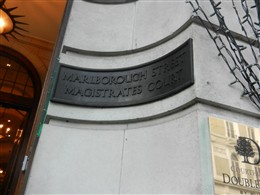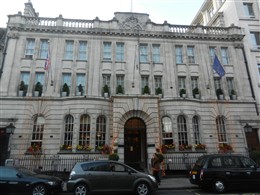Harvey Gould and Heike Fischer

Marlborough Street Magistrates Court, Great Marlborough Street
Patrick Collins

Marlborough Street Magistrates Court, Great Marlborough Street
Patrick Collins
Memories of the Second World War
By Patrick Collins
Harvey Gould was born on 29 December 1928 in Forest Gate in East London. He was referred to as a “cockney” because he was born within the sound of Bow Bells. In 1939, when Harvey was 11 years old, he remembered Germany invading Poland and realized that Great Britain would have to go to war against Germany later. Harvey remembered the Prime Minister, Neville Chamberlain, coming back from Germany with a white piece of paper. But as Harvey recalled: “peace in our time was a treaty, unfortunately it was not kept”.
Great Britain officially declared war against Germany on 3 September 1939 and Harvey and all of his family were devastated after they heard this news over the radio. Harvey discussed how Germany was very heavily-armed because they were preparing for war. He was also later amazed at how Germany could rebuild itself and still remain a superpower after the bombing of Dresden in 1945. Harvey even mentioned how Germany should be complimented for being able to rebuild at all.
Harvey had a good sense of what was going in the 1940s even though he was a young boy, and he followed news about the war on the radio as much as he could. Harvey remembers the arrival of American G.I.s while living in Soho, and he said that all the G.I.s went dancing looking for lovely English girls. He also remembers a lot of girls getting married to the G.I.s and later being referred to as G.I. brides. He also mentioned how a lot of the G.I.s used to congregate by Piccadilly Circus.
Harvey also remembers the Blitz quite fondly. He remembers how a siren used to be sounded and he recalls a siren on the roof of the Marlborough Street Magistrate Court on Great Marlborough Street. When there was a warning about a bomb the siren would go off and people would either go into a shelter or go into the Underground. Harvey remembers how Leicester Square was the deepest Underground station on the tube, and he also said that there was a garage down the road where he lived that was turned into an air raid shelter. Harvey said it was a safe shelter and he remembers collecting shrapnel from after the air raid.He sometimes collected the shells of incendiary bombs as well.
While Harvey grew up in a fairly rough time that does not mean that he did not have some fun as a child. Harvey discussed how he used to play football, rollerskate and play marbles. He recalled how he used to play a game called wicket, which is fairly similar to cricket. He said that in order to play wicket you had to put three little pieces of wood against the wall and you had to throw a ball at the wicket and try to knock down just one stick.
Harvey also remembers VE Day, 8 May 1945, and he talked about how everyone was elated and overjoyed once victory against Germany was officially declared. Harvey said he was 16 at the time and that his friend’s father owned a grocery shop on St. Peter Street. He mentioned how he and his family had a tea urn that they filled with water. Harvey and his family also had a barrow on which they would put the tea urn, after filling it with water or orange juice. They would then wheel the barrow down to Trafalgar Square and Harvey and his family would then try to sell their drinks from cardboard cups. Harvey mentioned how he and his family did not have a lot of cash and were trying to basically make pocket money.
Harvey has been asked recently about how he feels about Germany and German people today, and he responded by saying that he forgives Germany and thinks that it is a great country. He also added by saying that he has been to Munich and other areas of Germany and feels quite happy being around German people. Harvey also talked about how he did not like Germany during the war, especially since he is Jewish, and he said that he will never forget about Auschwitz and the concentration camps that Germany set up for Jewish people. He talked about how he saw what was going on in the concentration camps after going to the cinema in London, but even after all this Harvey has learned to move on from what Germany did in the past.
Harvey also talked about rationing during World War II. He spoke of how he and other people carried around ration books and how there was a minimum number of items that you could buy. Harvey said this included two ounces of tea but no chocolates and no sweets. He said that everything was rationed and you needed to have a ration book wherever you went. He said that people had a coupon that they would give to a shopkeeper and people such as Harvey only had a limited number of coupons per week. Harvey said that everyone had to get as many things as they could. Harvey has also talked about people known as 'Spivs' who operated on the black market which was a major problem in Soho in the 1940s. He said they tried to sell things at very high prices that they would not be able to sell normally.
Another story similar to that of Harvey’s is one from a woman named Heike Fischer. Heike was born in Hamburg, Germany on 30 January 1938. The day that Heike was born was a historic day in Germany, but not for a particularly good reason. On 30 January 1938 Adolf Hitler was being celebrated for being a great leader ever since becoming Chancellor of Germany on 30 January 1933. Every year on 30 January during the Hitler period was referred to in Germany as the “Nationale Machterhebung Von Hitler”. In 1943, when Heike was five years old, she lived with her family in an underground bunker in Hamburg. Heike’s family was comprised of her, her mother, her father, her sister, and two brothers.
Heike and her family were forced to live underground because Germany was being bombed by British and American aircraft. Heike remembers 1943 because Hamburg was heavily bombed that year, and she remembers having to stay in a bunker with no light and with the doors closed. Heike was finally happy to get out of the bunker and wanted to see if her grandmother’s house across the street was intact or if it had been bombed. Heike remembers seeing many houses across the street that were destroyed, but her grandmother’s house was alright. Heike discussed how the bombing of Hamburg was just as terrible as the infamous bombing of Dresden.
Even though the bombing of cities such as Hamburg was seen as being unnecessary by most a memorial to the RAF Bomber Command aircrew was recently unveiled in Hyde Park in London. If you click on this link you will be able to see pictures and learn more about the memorial.
http://www.thenews.pl/1/10/Artykul/104335,Poles-among-those-remembered-in-UKs-WWII-bomber-memorial